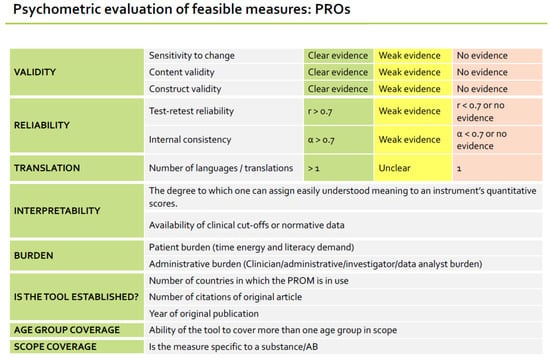
An International, Multidisciplinary Consensus Set of Patient-Centered Outcome Measures for Substance-Related and Addictive Disorders
Background: In 1990, the United States’ Institute of Medicine promoted the principles of outcomes monitoring in the alcohol and other drugs treatment field to improve the evidence synthesis and quality of research. While various national outcome measures have been developed and employed, no global consensus on standard measurement has been agreed for addiction. It is thus timely to build an international consensus. Convened by the International Consortium for Health Outcomes Measurement (ICHOM), an international, multi-disciplinary working group reviewed the existing literature and reached consensus for a globally applicable minimum set of outcome measures for people who seek treatment for addiction. Methods: To this end, 26 addiction experts from 11 countries and 5 continents, including people with lived experience (n = 5; 19%), convened over 16 months (December 2018–March 2020) to develop recommendations for a minimum set of outcome measures. A structured, consensus-building, modified Delphi process was employed. Evidence-based proposals for the minimum set of measures were generated and discussed across eight videoconferences and in a subsequent structured online consultation. The resulting set was reviewed by 123 professionals and 34 people with lived experience internationally. Results: The final consensus-based recommendation includes alcohol, substance, and tobacco use disorders, as well as gambling and gaming disorders in people aged 12 years and older. Recommended outcome domains are frequency and quantity of addictive disorders, symptom burden, health-related quality of life, global functioning, psychosocial functioning, and overall physical and mental health and wellbeing. Standard case-mix (moderator) variables and measurement time points are also recommended. Conclusions: Use of consistent and meaningful outcome measurement facilitates carer–patient relations, shared decision-making, service improvement, benchmarking, and evidence synthesis for the evaluation of addiction treatment services and the dissemination of best practices. The consensus set of recommended outcomes is freely available for adoption in healthcare settings globally.
- Black, N., Chung, S., Tisdale, C., Fialho, L. S., Aramrattana, A., Assanangkornchai, S., Blaszczynski, A., Bowden-Jones, H., Van Den Brink, W., Brown, A., Brown, Q. L., Cottler, L. B., Elsasser, M., Ferri, M., Florence, M., Gueorguieva, R., Hampton, R., Hudson, S., Kelly, P. J., … Farrell, M. (2024). An International, Multidisciplinary Consensus Set of Patient-Centered Outcome Measures for Substance-Related and Addictive Disorders. Journal of Clinical Medicine, 13(7), 2154. https://doi.org/10.3390/jcm13072154
背景 1990年、米国医学研究所は、エビデンスの統合と研究の質を向上させるため、アルコール・その他の薬物治療分野におけるアウトカムモニタリングの原則を推進した。様々な国のアウトカム測定法が開発され採用されてきたが、嗜癖に関する標準的な測定法に関する世界的なコンセンサスは得られていない。したがって、国際的なコンセンサスを構築することは時宜を得たものである。International Consortium for Health Outcomes Measurement(ICHOM)により招集された国際的な学際的作業部会は、既存の文献を検討し、嗜癖の治療を受ける人々に対して世界的に適用可能な転帰尺度の最低セットに関するコンセンサスに達した。方法 この目的のため、生活経験者(n=5;19%)を含む11カ国・5大陸の26人の嗜癖専門家が16ヵ月間(2018年12月~2020年3月)にわたって招集され、転帰尺度の最小セットの推奨を策定した。構造化された、合意形成のための修正デルファイプロセスが採用された。8回のビデオ会議と、それに続く構造化されたオンライン協議において、最小限の評価指標のためのエビデンスに基づく提案が作成され、議論された。その結果、123人の専門家と34人の国際的な生活体験者によって検討された。その結果 最終的なコンセンサスに基づく勧告には、アルコール、薬物、タバコの使用障害、および12歳以上のギャンブルとゲーム行動症が含まれる。推奨されるアウトカムドメインは、嗜癖性障害の頻度と量、症状負担、健康関連QOL、グローバル機能、心理社会的機能、身体的・精神的健康全般とウェルビーイングである。標準的な症例混合(moderator)変数と測定時点も推奨される。結論 一貫性のある有意義なアウトカム測定を用いることで、介護者と患者の関係、意思決定の共有、サービスの改善、ベンチマーキング、嗜癖治療サービスの評価やベストプラクティスの普及のためのエビデンスの統合が容易になる。推奨されるアウトカムのコンセンサスセットは、世界中の医療現場で自由に採用できる。
